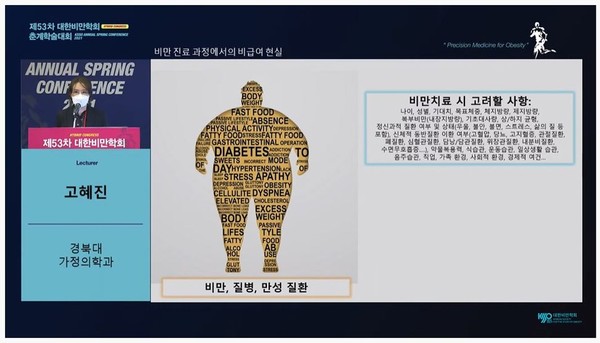Obesity is not a cosmetic problem but a disease that requires treatment, but medical professionals experience difficulties curing it to cost concerns, Professor Koh Hye-jin at Kyungpook National University Hospital said Saturday.

"Obesity requires more hours of treatment than general diseases and requires counseling and education, but it is difficult to manage patients in clinical practice because the health insurance does not cover obesity treatment,” Professor Koh said during the 53rd annual spring conference of the Korean Society for the study of Obesity (KSSO) held online and offline.
As obesity is a chronic disease that requires long-term and continuous drug treatment, patients feel a significant cost burden due to the absence of such reimbursement, she added.
Professor Koh stressed that the government should designate medical consultation costs as patients may avoid visiting hospitals due to cost burdens.
"Obese patients have social and economic problems with various medical complications," Koh said. "Therefore, medical professionals have to take into account the socioeconomic environment of the patient in addition to listening to the medical history of obese patients. In the process, the consultation time is inevitably longer than when treating general patients.”
However, Koh pointed out that there is no insurance coverage for treating obese patients.
"If the consultation time is prolonged when treating obese patients, it can result in the decrease in the number of patients treated and may make it difficult to treat obese patients properly," Koh said. "If the government sets a consultation fee, medical staff will be able to treat the patients better and provide proper obesity treatment."
Koh also pointed to the need for nutritional counseling after obesity metabolic surgery.
"After the obesity metabolic surgery, nutritional counseling is necessary. As there are no fixed medical fees for it, it is not easy for medical workers to ask a nutritionist for counseling," she said.
As the health authorities do not reimburse obesity treatment drugs, patients are spending excessive medical expenses and feeling burdens, she noted.
Because there is no reimbursement system and the price of obesity treatments varies among hospitals and pharmacies, patients tend to look for cheaper places to find the drugs.
"In the case of ultra-obese patients, we try to manage other underlying diseases and administer drugs so that they can lose weight as much as possible before receiving metabolic surgery," Koh said. "Despite the weight change, however, the patient wanted to stop the medication because of the cost burden."
Professor Koh also stressed the need to reimburse excessively loose skin after significant weight loss for ultra-obesity patients.
"If someone loses 30 to 40 kg of weight, their skin may become saggy, which, in turn, may require them to receive plastic surgery," she said. "The government provides health insurance benefits to breast reconstruction for breast cancer patients. Likewise, it should reimburse obese patients who suffer from excessive loose skin after weight loss."

